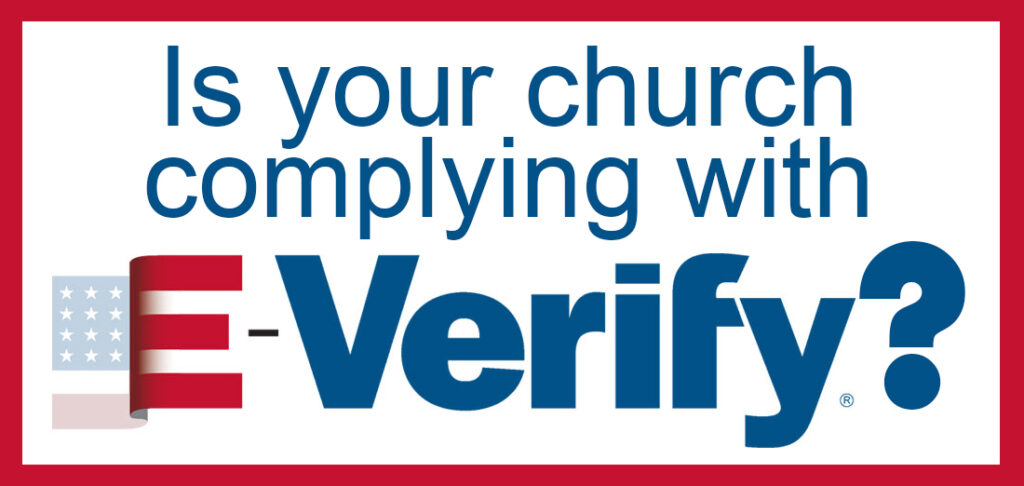
State law requires churches to file certain forms whenever they hire new employees, whether the employees are clergy or lay. The South Carolina Conference of The United Methodist Church strongly encourages local church leaders to ensure that they are in compliance with the “South Carolina Illegal Immigration and Reform Act.”
That law requires all employers to enroll in the U.S. Department of Homeland Security’s E-Verify system and to verify the legal status of all new employees – both clergy and lay – through E-Verify within three business days. Failure to enroll in and use E-Verify to verify new hires will result in probation for the employer or suspension/revocation of the employer’s business licenses.
In addition to complying with the law for any new hires, it would be prudent for churches to review their personnel files to ensure this documentation is in order for any current employee hired since Jan. 1, 2012. Here are the specifics:
E-Verify and Employment Eligibility
Verification Requirements
In addition to completing and maintaining the federal employment eligibility verification form, more commonly known as Form I-9, all South Carolina employers must, within three business days after employing a new employee:
• Verify the employee’s work authorization through the E-Verify federal work authorization program administered by the U.S. Department of Homeland Security.
• Employers may no longer confirm a new employee’s employment authorization with a driver’s license or state identification card.
What is E-Verify?
E-Verify is a free internet-based system maintained by the U.S. Department of Homeland Security. It compares the information an employee provides on Form I-9 against millions of government records maintained by the Department of Homeland Security and the Social Security Administration. The database generally provides results in three to five seconds.
• If the information matches, the employee is eligible to work in the United States.
• If there’s a mismatch, E-Verify will alert the employer and the employee will be allowed to work while he or she resolves the problem.
To enroll in E-Verify, go to dhs.gov/e-verify.
Source: South Carolina Department of Labor, Licensing and Regulation
South Carolina New Hire/Rehire Reporting
The Personal Responsibility and Work Opportunity Reconciliation Act of 1996 requires employers to report the following data for each newly hired or rehired employee – both clergy and lay – within 20 days:
• Employer name
• Employer address
• Employer Federal Identification Number
• Employer phone number (optional)
• Employee name
• Employee address
• Employee Social Security Number
• Employee date of birth
• Employee date of remuneration (first day of work)
New hire information submitted by employers will only be used for purposes prescribed by law, including:
• Establish and enforce child support orders
• Detect Unemployment Benefits overpayments and fraud
• Detect Workers’ Compensation overpayments and fraud
• Detect overpayments and fraud in other government programs, such as Welfare and Food Stamps
The penalty for an employer’s failure to report newly hired or rehired employees is:
• $25 for the second offense and $25 for each offense thereafter; or
• $500 for each and every offense, if the failure to report is the result of a conspiracy between the employer and the employee not to supply the required information or to supply false or incomplete information.
The South Carolina New Hire Reporting Program is administered by the South Carolina Department of Social Services.
To report a new hire, go to newhire.sc.gov. You will need to create a user and log in to record the information.

